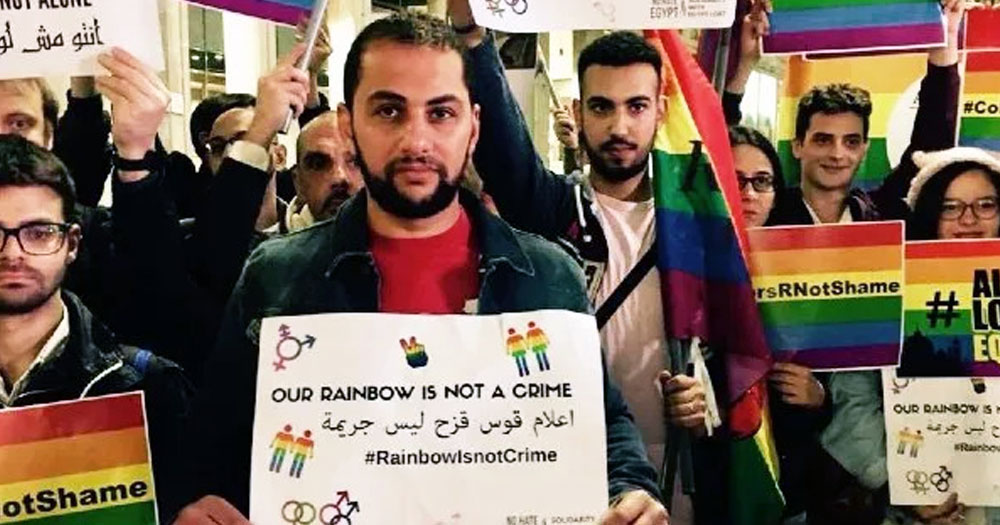A new documentary released by the BBC unveiled how Egyptian police are using online dating apps to target and entrap members of the LGBTQ+ community.
The new BBC documentary titled Queer Egypt Under Attack was released on January 30. It details a two-year investigation conducted by journalist Ahmed Shihab-Eldin on how the police in Egypt are targeting LGBTQ+ people using dating apps to lure and entrap them, before eventually prosecuting them.
While same-sex relationships are not illegal in Egypt, the queer community faces discrimination and abuse from authorities due to a law against “debauchery”. The law primarily targets sex work, but it has been repeatedly used to persecute LGBTQ+ people in the country.
A report published by Human Rights Watch in 2020 detailed how Egyptian authorities “arbitrarily arrest lesbian, gay, bisexual, and transgender (LGBT) people and detain them in inhuman conditions, systematically subject them to ill-treatment including torture, and often incite fellow inmates to abuse them”.
In the BBC documentary, reporter Ahmed Shihab-Eldin, who himself grew up in Egypt, discovered that the police there initiate conversations with members of the LGBTQ+ community through dating apps such as WhosHere or Grindr, with the purpose of encouraging them to meet and then charge them under the “debauchery” law, often fabricating evidence against them.
“The reality is that Egyptian police security officers arbitrarily arrest lesbian, gay, bisexual, and transgender people,” Shihab-Eldin said. “They detain them in inhumane conditions, they subject them to all kinds of abuse and this is well-documented.”
“Friends there tell me that the atmosphere has recently become far more brutal, and the tactics for tracking down LGBT people more sophisticated.” he explained.
BBC News investigates how the LGBT+ community are being targeted by police and violent gangs in Queer Egypt Under Attack, available from 30th January on Youtube and BBC iplayer.#lgbt #Eygpt #iplayer #YouTube pic.twitter.com/ypXFIdLPU9
— Directors Cut Films (@directorscutuk) January 30, 2023
The journalist met with several members of the LGBTQ+ community in Egypt who have been targeted by authorities via these means. One of them, identified as Laith, described how he had arranged to meet an acquaintance for a date when the police arrested him and threatened to fabricate evidence against him if he didn’t agree to be their informant.
When Laith didn’t comply with their order, he was charged with “habitual debauchery” after the police created a fake profile for him in which it appeared that he was selling sex. He was then sentenced to three months in jail, which were then reduced to one once he appealed.
Others like him reported stories of fake evidence and forced confessions. The investigation also uncovered how the police targets not only Egyptian LGBTQ+ citizens, but also foreigners. One person, named as Matt in the documentary, recounted how they were lured by the local authorities through Grindr, before being arrested and deported.
As noted in the BBC documentary, Egyptian government officials had already admitted to targeting LGBTQ+ people in the country back in 2020. At the time, former assistant of Minister of Interior Ahmed Taher commented on the issue, saying: “We recruited police in the virtual world to uncover the masses of group sex parties, homosexual gatherings”.
While dating apps are now issuing warnings to their users about potential police presence on their platforms, the LGBTQ+ community remains vulnerable to these strategies. Moreover, the police are not the only ones to use these tactics to find queer people. Criminal gangs are also using dating sites to lure them and then film violent humiliation videos which they use to extort them.
https://twitter.com/_Faith_T/status/1620666478776442880?s=20&t=VSdEafDGge4dFbLg7540Xg
Speaking of the people he encountered who shared their experiences of being targeted by these gangs, Shihab-Eldin said: “The level of fear, the level of despair and the level of pain that each of them shared with us and that we were documenting is a lot, it’s heavy.”
“There’s no safe place to turn. They can’t go to the authorities. They can’t turn to their families – so many of them get kicked out of their homes, the same stories of neglect, dehumanisation.” he said.
© 2023 GCN (Gay Community News). All rights reserved.
Support GCN
GCN is a free, vital resource for Ireland’s LGBTQ+ community since 1988.
GCN is a trading name of National LGBT Federation CLG, a registered charity - Charity Number: 20034580.
GCN relies on the generous support of the community and allies to sustain the crucial work that we do. Producing GCN is costly, and, in an industry which has been hugely impacted by rising costs, we need your support to help sustain and grow this vital resource.
Supporting GCN for as little as €1.99 per month will help us continue our work as Ireland’s free, independent LGBTQ+ media.
